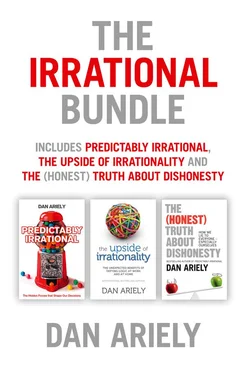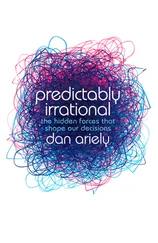Dan Ariely - The Irrational Bundle
Здесь есть возможность читать онлайн «Dan Ariely - The Irrational Bundle» — ознакомительный отрывок электронной книги совершенно бесплатно, а после прочтения отрывка купить полную версию. В некоторых случаях можно слушать аудио, скачать через торрент в формате fb2 и присутствует краткое содержание. Жанр: unrecognised, на английском языке. Описание произведения, (предисловие) а так же отзывы посетителей доступны на портале библиотеки ЛибКат.
- Название:The Irrational Bundle
- Автор:
- Жанр:
- Год:неизвестен
- ISBN:нет данных
- Рейтинг книги:3 / 5. Голосов: 1
-
Избранное:Добавить в избранное
- Отзывы:
-
Ваша оценка:
- 60
- 1
- 2
- 3
- 4
- 5
The Irrational Bundle: краткое содержание, описание и аннотация
Предлагаем к чтению аннотацию, описание, краткое содержание или предисловие (зависит от того, что написал сам автор книги «The Irrational Bundle»). Если вы не нашли необходимую информацию о книге — напишите в комментариях, мы постараемся отыскать её.
The Irrational Bundle — читать онлайн ознакомительный отрывок
Ниже представлен текст книги, разбитый по страницам. Система сохранения места последней прочитанной страницы, позволяет с удобством читать онлайн бесплатно книгу «The Irrational Bundle», без необходимости каждый раз заново искать на чём Вы остановились. Поставьте закладку, и сможете в любой момент перейти на страницу, на которой закончили чтение.
Интервал:
Закладка:
Toward the end of the tour I found myself in Barcelona. There I met Jon, an American tourist who, like me, did not speak any Spanish. We felt an immediate camaraderie. I imagine this kind of bonding happens often with travelers from the same country who are far from home and find themselves sharing observations about how they differ from the locals around them. Jon and I ended up having a wonderful dinner and a deeply personal discussion. He told me things that he seemed not to have shared before, and I did the same. There was an unusual closeness between us, as if we were long-lost brothers. After staying up very late talking, we both needed to sleep. We would not have a chance to meet again before parting ways the following morning, so we exchanged e-mail addresses. This was a mistake.
About six months later, Jon and I met again for lunch in New York. This time, it was hard for me to figure out why I’d felt such a connection with him, and no doubt he felt the same. We had a perfectly amicable and interesting lunch, but it lacked the intensity of our first meeting, and I was left wondering why.
In retrospect, I think it was because I’d fallen victim to the effects of relativity. When Jon and I first met, everyone around us was Spanish, and as cultural outsiders we were each other’s best alternative for companionship. But once we returned home to our beloved American families and friends, the basis for comparison switched back to “normal” mode. Given this situation, it was hard to understand why Jon or I would want to spend another evening in each other’s company rather than with those we love.
My advice? Understand that relativity is everywhere, and that we view everything through its lens—rose-colored or otherwise. When you meet someone in a different country or city and it seems that you have a magical connection, realize that the enchantment might be limited to the surrounding circumstances. This realization might prevent you from subsequent disenchantment.
CHAPTER 2
The Fallacy of Supply and Demand
Why the Price of Pearls—and Everything Else—
Is Up in the Air
At the onset of World War II, an Italian diamond dealer, James Assael, fled Europe for Cuba. There, he found a new livelihood: the American army needed waterproof watches, and Assael, through his contacts in Switzerland, was able to fill the demand.
When the war ended, Assael’s deal with the U.S. government dried up, and he was left with thousands of Swiss watches. The Japanese needed watches, of course. But they didn’t have any money. They did have pearls, though—many thousands of them. Before long, Assael had taught his son how to barter Swiss watches for Japanese pearls. The business blossomed, and shortly thereafter, the son, Salvador Assael, became known as the “pearl king.”
The pearl king had moored his yacht at Saint-Tropez one day in 1973, when a dashing young Frenchman, Jean-Claude Brouillet, came aboard from an adjacent yacht. Brouillet had just sold his air-freight business and with the proceeds had purchased an atoll in French Polynesia—a blue-lagooned paradise for himself and his young Tahitian wife. Brouillet explained that its turquoise waters abounded with black-lipped oysters, Pinctada margaritifera. And from the black lips of those oysters came something of note: black pearls.
At the time there was no market for Tahitian black pearls, and little demand. But Brouillet persuaded Assael to go into business with him. Together they would harvest black pearls and sell them to the world. At first, Assael’s marketing efforts failed. The pearls were gunmetal gray, about the size of musket balls, and he returned to Polynesia without having made a single sale. Assael could have dropped the black pearls altogether or sold them at a low price to a discount store. He could have tried to push them to consumers by bundling them together with a few white pearls. But instead Assael waited a year, until the operation had produced some better specimens, and then brought them to an old friend, Harry Winston, the legendary gemstone dealer. Winston agreed to put them in the window of his store on Fifth Avenue, with an outrageously high price tag attached. Assael, meanwhile, commissioned a full-page advertisement that ran in the glossiest of magazines. There, a string of Tahitian black pearls glowed, set among a spray of diamonds, rubies, and emeralds.
The pearls, which had shortly before been the private business of a cluster of black-lipped oysters, hanging on a rope in the Polynesian sea, were soon parading through Manhattan on the arched necks of the city’s most prosperous divas. Assael had taken something of dubious worth and made it fabulously fine. Or, as Mark Twain once noted about Tom Sawyer, “Tom had discovered a great law of human action, namely, that in order to make a man covet a thing, it is only necessary to make the thing difficult to attain.”
HOW DID THE pearl king do it? How did he persuade the cream of society to become passionate about Tahitian black pearls—and pay him royally for them? In order to answer this question, I need to explain something about baby geese.
A few decades ago, the naturalist Konrad Lorenz discovered that goslings, upon breaking out of their eggs, become attached to the first moving object they encounter (which is generally their mother). Lorenz knew this because in one experiment he became the first thing they saw, and they followed him loyally from then on through adolescence. With that, Lorenz demonstrated not only that goslings make initial decisions based on what’s available in their environment, but that they stick with a decision once it has been made. Lorenz called this natural phenomenon imprinting.
Is the human brain, then, wired like that of a gosling? Do our first impressions and decisions become imprinted? And if so, how does this imprinting play out in our lives? When we encounter a new product, for instance, do we accept the first price that comes before our eyes? And more importantly, does that price (which in academic lingo we call an anchor) have a long-term effect on our willingness to pay for the product from then on?
It seems that what’s good for the goose is good for humans as well. And this includes anchoring. From the beginning, for instance, Assael “anchored” his pearls to the finest gems in the world—and the prices followed forever after. Similarly, once we buy a new product at a particular price, we become anchored to that price. But how exactly does this work? Why do we accept anchors?
Consider this: if I asked you for the last two digits of your social security number (mine are 79), then asked you whether you would pay this number in dollars (for me this would be $79) for a particular bottle of Côtes du Rhône 1998, would the mere suggestion of that number influence how much you would be willing to spend on wine? Sounds preposterous, doesn’t it? Well, wait until you see what happened to a group of MBA students at MIT a few years ago.
“NOW HERE WE have a nice Côtes du Rhône Jaboulet Parallel,” said Drazen Prelec, a professor at MIT’s Sloan School of Management, as he lifted a bottle admiringly. “It’s a 1998.”
At the time, sitting before him were the 55 students from his marketing research class. On this day, Drazen, George Loewenstein (a professor at Carnegie Mellon University), and I would have an unusual request for this group of future marketing pros. We would ask them to jot down the last two digits of their social security numbers and tell us whether they would pay this amount for a number of products, including the bottle of wine. Then, we would ask them to actually bid on these items in an auction.
What were we trying to prove? The existence of what we called arbitrary coherence. The basic idea of arbitrary coherence is this: although initial prices (such as the price of Assael’s pearls) are “arbitrary,” once those prices are established in our minds they will shape not only present prices but also future prices (this makes them “coherent”). So, would thinking about one’s social security number be enough to create an anchor? And would that initial anchor have a long-term influence? That’s what we wanted to see.
Читать дальшеИнтервал:
Закладка:
Похожие книги на «The Irrational Bundle»
Представляем Вашему вниманию похожие книги на «The Irrational Bundle» списком для выбора. Мы отобрали схожую по названию и смыслу литературу в надежде предоставить читателям больше вариантов отыскать новые, интересные, ещё непрочитанные произведения.
Обсуждение, отзывы о книге «The Irrational Bundle» и просто собственные мнения читателей. Оставьте ваши комментарии, напишите, что Вы думаете о произведении, его смысле или главных героях. Укажите что конкретно понравилось, а что нет, и почему Вы так считаете.












